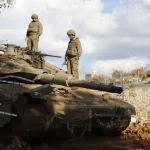Jerusalem, 17 June, 2025 (TPS-IL) — In a war many feared could spiral into a regional inferno, one Israeli expert says Iran has already suffered a decisive early blow and warned against easing the pressure.
“Israel achieved total air superiority over Iranian skies,” Brig. Gen. (res.) Danny Van-Buren told The Press Service of Israel, calling the lightning strikes on Iran’s military infrastructure a “de facto defeat.”
Van-Buren is the head of Called to the Flag, a civic movement founded in 2023 aimed at uniting Israeli society and strengthening its Zionist, Jewish, liberal-democratic identity. He is also a research fellow at the Israeli Center for Grand Strategy located near Tel Aviv.
“Israel and the IDF [Israel Defense Forces] have carried out a historic operation here,” Brig. Gen. (res.) Danny Van-Buren told The Press Service of Israel. “Within a very short time, Israel achieved total air superiority over Iranian skies. Effectively, it’s a de facto defeat in the early stages of the war.”
Iran is known to have worked through proxies in the past, funding and supplying weapons to the Houthis in Yemen, to Hezbollah, to Hamas and other terror groups.
“The method they used was to create a network of proxies to attack Israel on command day,” said Van-Buren. “I would say that Israel has almost totally succeeded in dismantling this program and all of its proxies, we see that Hezbollah doesn’t dare intervene, and Hamas is unable to intervene in the conflict. In effect, all of Iran’s layers of defense have been neutralized.”
Israel’s timing of the strike was based on the state of Iran’s proxies, launching a war, “something Iran did not believe would happen — opening with a brilliant first move,” said Van-Buren. The IDF managed to deal “a major blow”, by neutralizing the command-and-control systems, the senior commanders, the air defense and part of the offensive missile array that Iran had built.
“Israel now fully controls the aerial space over a giant enemy like Iran, which currently has no defensive capability,” said Van-Buren. Iran still managed to launch ballistic missiles at Israel, killing 24 Israelis and injured 647, as well as causing severe property damage.
“These do cause damage, certainly painful and deadly damage from Israel’s perspective, but overall, Iran is currently operating what it had prepared as a contingency, and Israel now has almost complete control over the airspace above Iran.”
From Precision to Panic
Most of Iran’s missiles fired since Friday have landed in areas concentrated with civilians. That’s in contrast to Iranian barrages in April and October of 2024.
In those attacks, “Iran launched several hundred ballistic missiles and drones aimed very precisely at strategic targets, military bases, and infrastructure,” said Van-Buren.
But Tehran changed its strategy, partly because of lessons learned from 2024 and partly because Israel’s strike completely surprised the Iranian leadership.
“In contrast, what we’re seeing now is indiscriminate fire at civilian concentrations, at population centers. They try to cloak this with claims of targeting military objectives, but it’s clear they’re simply firing at civilians, aiming to kill as many Israelis as possible, destroy buildings, and sow chaos,” he said.
“In fact, the way Iran is behaving now — employing terrorism like a rogue state that kills civilians — it’s lost almost all its operational capabilities. This is a war that exposes the true nature of the regime.”
Tehran understands that targeting a single strategic site will fail, “so instead, they scatter their fire. By targeting densely populated areas like the Tel Aviv metropolitan area, even if only 8% or 10% get through, that’s a success in their eyes, as long as one missile hit,” Van-Buren said.
While Iran has successfully targeted the Weizmann Institute of Science in Rehovot and the Bazan oil refinery at Haifa’s port, “you see that the critical mass of missiles is aimed at civilian areas.”
Van-Buren warned against easing up on the attacks.
“I think the greatest danger would be to stop this operation, which is now perceived as a huge win, without achieving its full potential. If the strategic accomplishment of this operation would be to push Iran into a slightly better nuclear agreement, it would be a historic chance missed to topple this murderous regime,” he said.
Israel launched preemptive strikes against Iranian nuclear sites on Friday, citing intelligence that Tehran had reached “a point of no return” in its pursuit of nuclear weapons. According to Israeli defense officials, Iran has developed the capacity to rapidly enrich uranium and assemble nuclear bombs, with sufficient fissile material for up to 15 weapons.
Israeli intelligence also exposed a covert program to complete all components of a nuclear device. The strikes mark a dramatic escalation in what officials describe as a broader Iranian strategy combining nuclear development, missile proliferation, and proxy warfare aimed at Israel’s destruction.
































